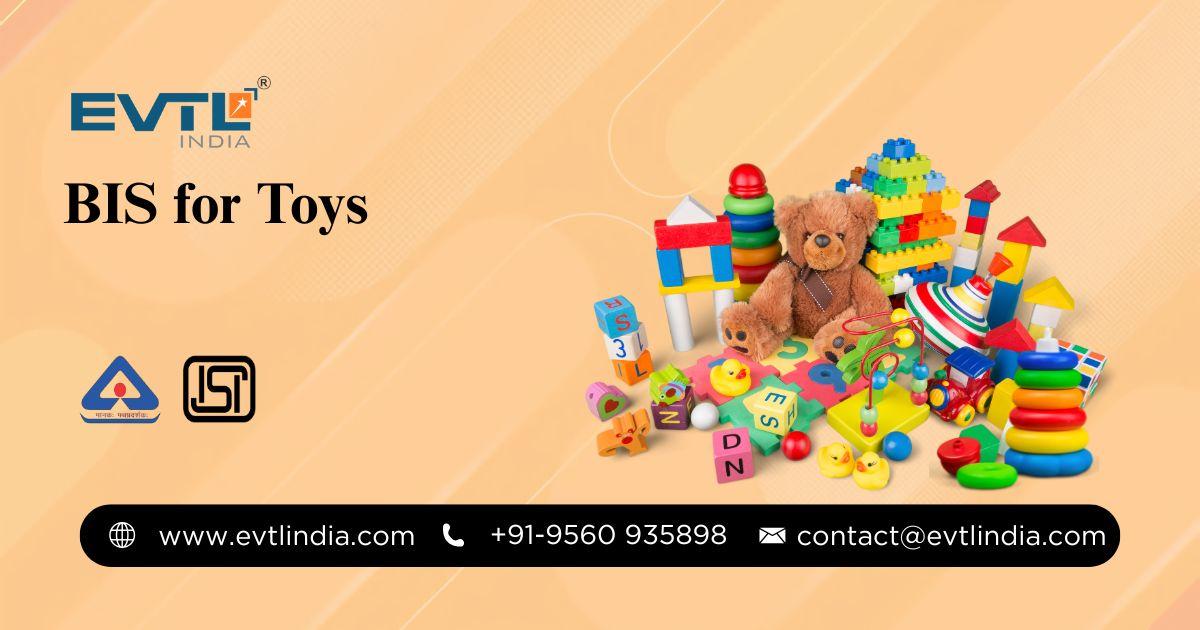BIS Certification for Toys: Ensuring Safety, Quality, and Trust in India’s Toy Industry

The toy industry in India has witnessed significant growth over the past decade, driven by rising consumer demand, innovation, and increasing awareness of safety standards. However, with growth comes the critical responsibility of ensuring that toys meet stringent safety and quality benchmarks. To safeguard children from harmful or substandard products, the Bureau of Indian Standards (BIS) mandates BIS certification for toys.
This certification guarantees that toys comply with the required Indian Standards, offering assurance to parents and retailers alike. Whether manufactured domestically or imported, toys sold in India must carry the ISI Mark for Toys, which is the symbol of trust, quality, and safety.
Why BIS Certification for Toys is Important
Toys are not just playthings; they contribute significantly to a child’s learning and development. Unsafe toys, however, can pose risks such as choking hazards, toxic chemical exposure, or mechanical injuries. This is where BIS for Toys plays an essential role.
-
Child Safety First: BIS standards ensure toys are free from harmful substances and safe for use by children of all age groups.
-
Consumer Confidence: Parents prefer toys with the ISI Certification for Toys as it assures safety and quality.
-
Legal Compliance: As per government regulations, it is mandatory for all toys sold in India to be BIS certified.
-
Market Advantage: Certified toys enjoy greater acceptance in both domestic and international markets, strengthening a brand’s credibility.
The ISI Mark for Toys
The ISI Mark for Toys is more than just a logo on packaging—it symbolizes compliance with strict safety and quality standards set by BIS. The ISI mark signifies that the toy has passed rigorous testing under recognized laboratories, covering:
-
Mechanical and physical properties (sharp edges, small parts, durability).
-
Chemical safety (absence of harmful chemicals, heavy metals, and toxins).
-
Flammability checks to ensure the toy does not pose fire risks.
-
Age-appropriate labeling and instructions to guide safe usage.
This certification builds trust among parents and enhances the brand reputation of manufacturers.
Types of Toys Covered Under BIS Certification
The scope of BIS certification for toys covers both electrically operated and non-electrical toys.
-
Non-Electrical Toys: Dolls, puzzles, plastic toys, wooden toys, and educational kits.
-
Electrical Toys: Battery-operated cars, talking dolls, robotic toys, and remote-controlled gadgets.
Each category is subjected to different safety parameters, ensuring every toy aligns with the highest safety benchmarks.
The BIS Certification Process for Toys
Obtaining ISI certification for toys involves several systematic steps to ensure compliance. Below is an outline of the process:
-
Application Filing: Manufacturers must submit an application to BIS along with required documents.
-
Product Testing: Samples are tested in BIS-recognized laboratories for mechanical, chemical, and physical safety.
-
Factory Inspection: BIS officials conduct audits to verify production capability, quality control measures, and compliance with standards.
-
Grant of License: Upon successful evaluation, manufacturers are granted permission to use the ISI Mark for Toys.
-
Ongoing Surveillance: BIS carries out periodic inspections and market sampling to maintain continuous compliance.
Documents Required for BIS Certification for Toys
Some key documents required include:
-
Business registration and manufacturing license.
-
Product details and test reports.
-
Quality control documents.
-
Factory layout and production process details.
-
Trademark registration (if applicable).
Role of BIS Consultant for Toys
Navigating the BIS certification process can be challenging for manufacturers due to its technical and procedural requirements. This is where a BIS consultant for toys becomes invaluable.
A consultant helps by:
-
Guiding through documentation and application procedures.
-
Coordinating with BIS and testing laboratories.
-
Ensuring timely audits and factory inspections.
-
Reducing the chances of application rejection.
-
Saving time and cost for manufacturers.
Working with an experienced BIS consultant for toys ensures that the certification process is smooth, efficient, and hassle-free.
Benefits of BIS Certification for Toy Manufacturers
For manufacturers, obtaining BIS for Toys offers several tangible benefits:
-
Legal Authorization: Compliance with government regulations prevents penalties and product bans.
-
Brand Value: Toys with ISI certification are perceived as trustworthy and high-quality.
-
Export Potential: Many international buyers prefer BIS-certified toys for imports.
-
Consumer Loyalty: Parents prioritize certified toys, ensuring higher sales.
-
Sustainability: Certification ensures safe materials and eco-friendly production practices.
Challenges in BIS Certification for Toys
Despite its advantages, manufacturers often face hurdles such as:
-
Lengthy documentation process.
-
Cost of product testing and certification.
-
Stringent audits by BIS officials.
-
Lack of awareness among small-scale manufacturers.
These challenges, however, can be mitigated by working with a reliable BIS consultant for toys, who provides expert guidance.
Conclusion
EVTL India is one of the leading BIS Consultant in India, helping manufacturers obtain their BIS licences hassle-free. The Indian toy market is expanding rapidly, but ensuring child safety remains the top priority. With BIS certification for toys, manufacturers demonstrate their commitment to quality, safety, and compliance with national standards. The ISI mark for toys is not just a regulatory requirement; it is a symbol of trust that strengthens consumer confidence.
Partnering with a professional BIS consultant for toys makes the certification journey seamless, helping businesses enter the market legally while building a reputation for safety and reliability. In a competitive industry, BIS certification is not just mandatory—it is the foundation for long-term success.







